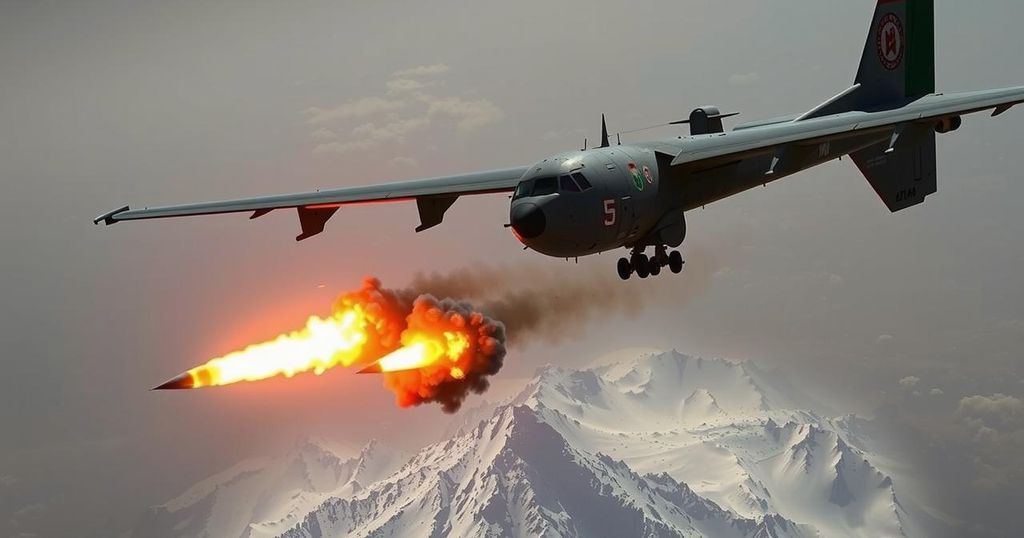Pakistani airstrikes in eastern Afghanistan resulted in 46 deaths, primarily among women and children, as reported by Taliban officials. The strikes raised serious concerns regarding bilateral relations, occurring amid ongoing military operations against the TTP. While Pakistan claims to target insurgents, Afghanistan vehemently protests, further straining ties between the two nations. Analysts warn of potential retaliatory attacks by the TTP in response to the strikes.
PESHAWAR, Pakistan (AP) — On Tuesday, Pakistani airstrikes in eastern Afghanistan reportedly resulted in the deaths of 46 individuals, primarily women and children, according to statements made by a Taliban official. Hamdullah Fitrat, the deputy spokesman for the Afghan government, indicated that the victims were refugees from Pakistan, emphasizing that six other individuals sustained injuries during the attacks. These strikes targeted four locations in the Barmal district of Paktika province, raising concerns about the already delicate relations between Pakistan and Afghanistan.
The airstrikes occurred shortly after Pakistani security officials stated the operation aimed to dismantle a terrorist training facility in Paktika, specifically targeting insurgents. In a statement by Mohammad Khurasani, the spokesman for the Tehreek-e-Taliban Pakistan (TTP), it was claimed that 50 people died, including 27 women and children, all identified as unarmed refugees who had fled from Pakistan’s military campaigns.
The TTP subsequently released images purportedly showing the aftermath of the attack, including casualties. This military action coincided with an official visit to Kabul by Mohammad Sadiq, Pakistan’s special representative for Afghanistan, intended to address various bilateral issues. Following the airstrikes, Afghanistan’s Foreign Ministry issued a robust condemnation, asserting that these actions would not be tolerated and could escalate tensions further. The Ministry urged vigilance and readiness to defend Afghan sovereignty against such incursions.
No formal response has been issued by Pakistan regarding the strikes. Nonetheless, the Pakistani military press release highlighted the killing of 13 insurgents in a separate operation in South Waziristan. Pakistan’s Interior Minister Mohsin Naqvi praised security forces for their efforts against perceived threats but did not address the cross-border strikes directly. The Taliban’s Defense Ministry condemned the airstrikes and vowed retaliation, indicating a possibility of escalating conflict.
Local analysts suggest that the TTP might retaliate following the substantial casualties inflicted, pointing to rising tensions exacerbated by an increase in militant assaults against Pakistan. Syed Muhammad Ali, a security analyst based in Islamabad, noted that Pakistan’s military actions reflect a growing impatience fueled by failed diplomatic attempts to curb TTP activities through negotiations. This has become critical as Pakistan experiences increased militant violence, evidenced by a recent TTP attack that resulted in the deaths of 16 soldiers at a checkpoint.
Amidst these developments, both nations have encountered significant challenges in managing their shared border, notably facing accusations that the Taliban has not effectively addressed militant activities against Pakistan, a claim that the Taliban authorities have denied, affirming their commitment to preventing hostile actions.
Overall, the ongoing conflict and resultant actions signify an urgent need for dialogue and reconciliation to prevent further deterioration in mutual relations between Pakistan and Afghanistan, while enhancing regional stability.
The recent airstrikes by Pakistan into eastern Afghanistan underscore a troubling escalation in regional tensions. Pakistan’s actions arise in the context of ongoing military operations against separatist groups within its territory, particularly the Tehreek-e-Taliban Pakistan (TTP). With the Taliban’s return to power in Afghanistan in 2021, the dynamics along the border have significantly changed, leading to increased violence and a complex security situation. The historical grievances and the presence of these militant groups make peace efforts fraught with challenges.
The airstrikes that resulting in significant civilian casualties raise critical questions about the stability of Pakistan-Afghanistan relations and the effectiveness of military operations targeting insurgents. As retaliatory measures from the TTP are anticipated, the potential for further conflict looms large. Moving forward, diplomatic efforts must be prioritized to mitigate tensions and address the root causes of instability in the region, highlighting the importance of cooperative governance in combating terrorism.
Original Source: www.pbs.org






